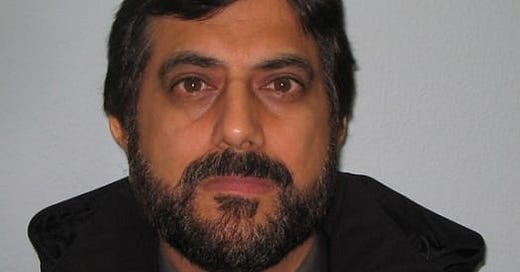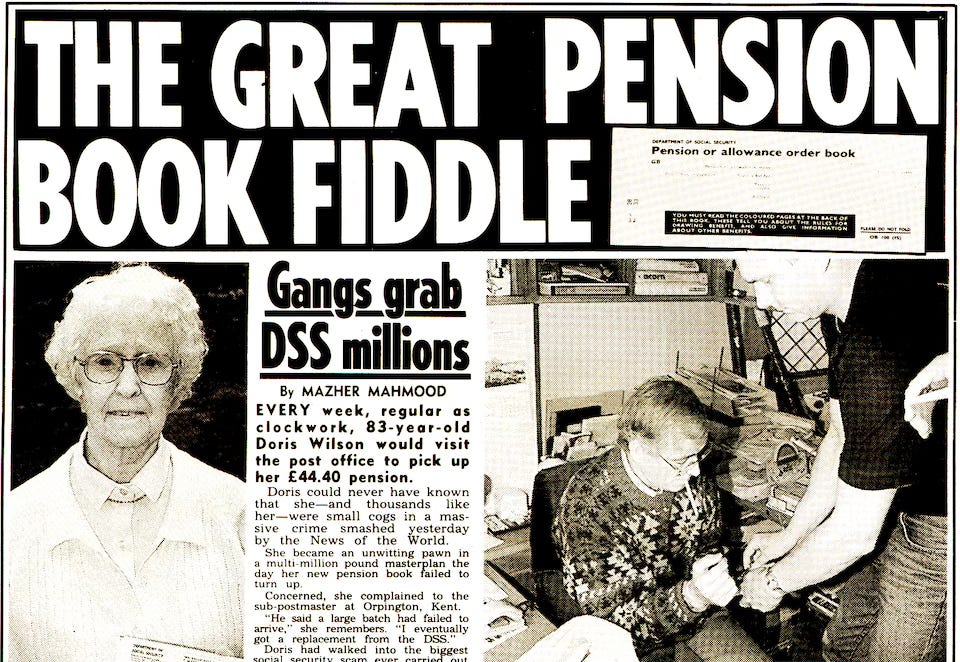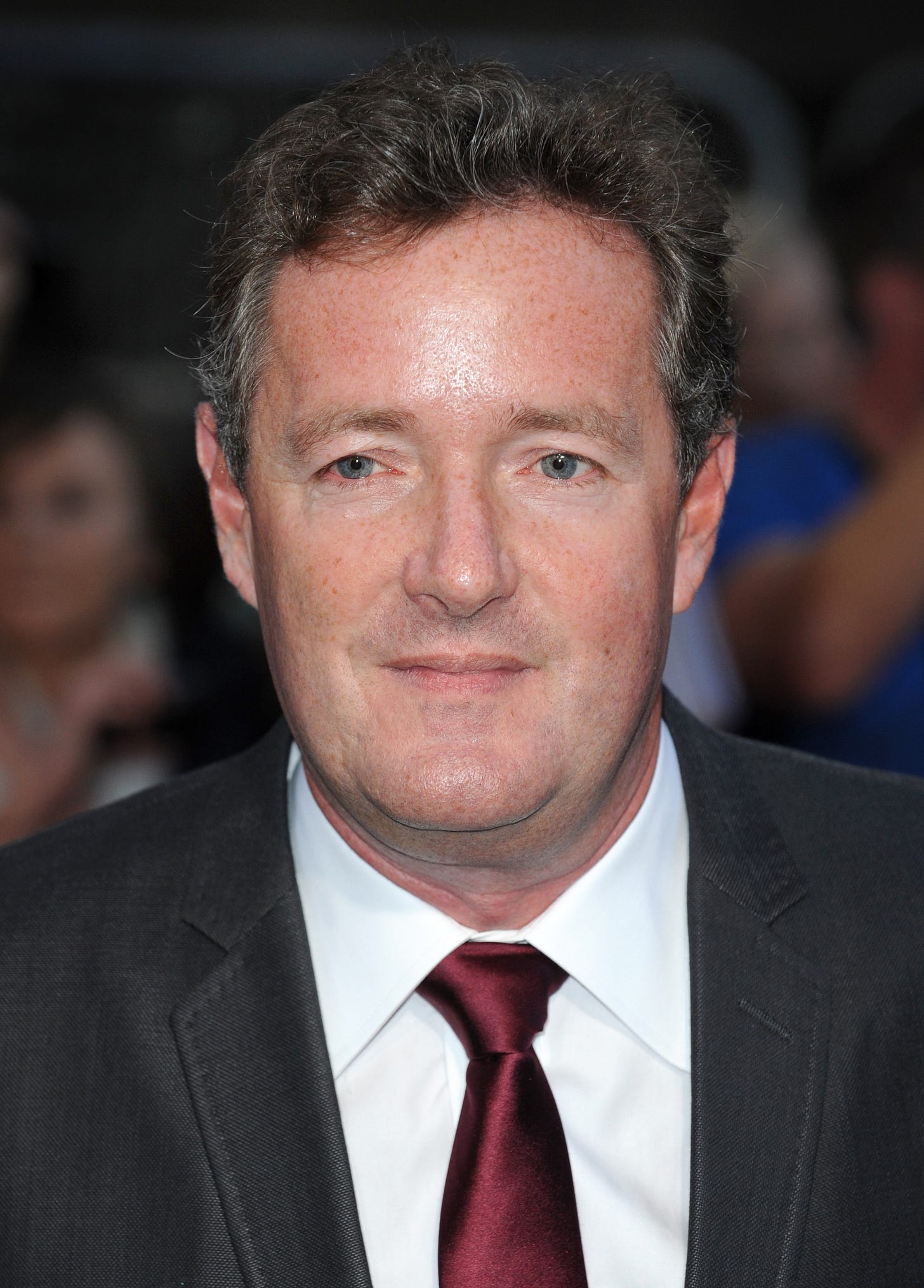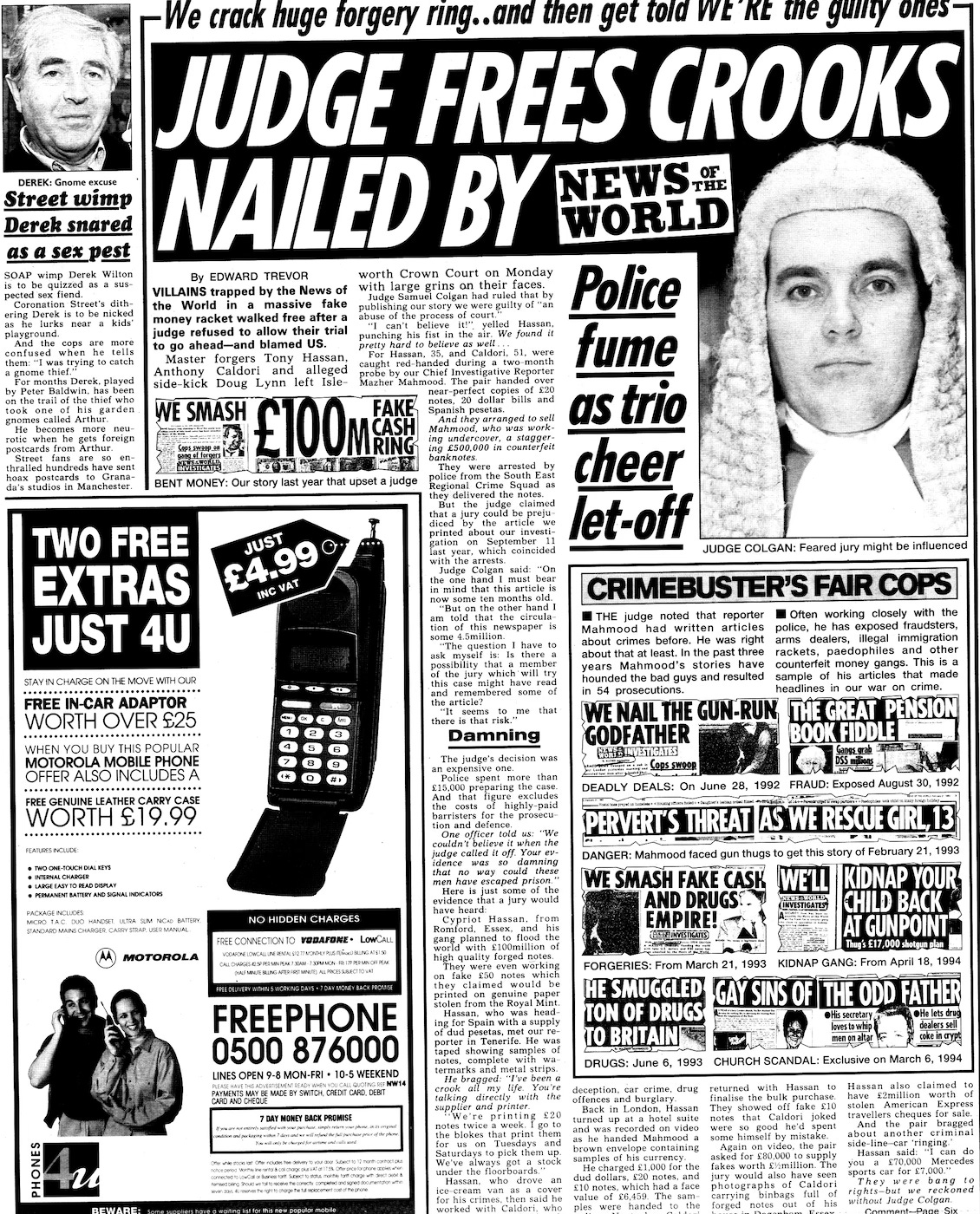NEW EVIDENCE has emerged about Piers Morgan’s role in creating Mazher “Fake Sheik” Mahmood.
Morgan was News of the World editor in 1994 when Mahmood lied to the court in a criminal case.
The trial collapsed.
Morgan did not discipline the reporter.
Instead he promoted him — launching a career that lasted another two decades before he was finally brought to book.
Again and again the Murdoch newspapers, the Crown Prosecution Service and the police ignored warnings that his evidence was often tainted.
He was finally gaoled for 15 months in 2016 after he was caught lying on oath in the trial of the singer Tulisa Contostavlos.
Supergrass
IT’S TUSDAY morning, 19 April 1994.
Piers Morgan is in his office at the News of the World.
He’s been editor for less than four months.
Today, he knows that Mazher Mahmood is giving evidence in an important criminal trial.
Morgan is expecting the reporter to chalk up another two successful prosecutions — he already has six under his belt.
Two men are on trial for conspiracy to supply stolen pension books after they were arrested by police selling samples to Mahmood.
It seems to be an open and shut case.
But later that day, Morgan hears that the case has collapsed — Mahmood was caught lying to the court.
The defendants had pleaded not guilty, claiming intimidation by the man they said was Mahmood’s source.
Mahmood refused to name his source but assured the court that he was not the man the defendants claimed had put pressure on them.
As a result, the judge dismissed a defence application that Mahmood identify his source.
But there was a dramatic development.
The prosecution told the judge he — and they — had been misled. The police had pictures of Mahmood’s source which showed he was the man the defendants accused of duress.
Mahmood had lied to the court.
There was another extraordinary revelation — Mahmood’s source was also a high level police informant, a supergrass.
When the judge said he was minded to order the name of the source to be disclosed to the defence, the prosecution threw in the towel.
The police wanted to protect the identity of their source.
No newspaper covered the case and the News of the World did not report the scandal of Mahmood’s false testimony.
It was first made public in the Press Gang article, Framed, published in May this year.
Unstoppable
SO WHAT did Morgan do?
Did he discipline his wayward reporter?
Did he warn him that when he gave evidence in court he had to tell the truth, the whole truth — and nothing but the truth?
He did not.
For Morgan, Mahmood and the News of the World it was business as usual.
In May, Mahmood had a front page story about a Tory MP’s affair with a gay man who was also involved with a Ministry of Defence official.
In his memoirs, published in 2005, Piers Morgan said the story:
… will shift a few papers, get followed up everywhere and ensure the NoW [New of the World] leads the news agenda again.
We’re on a roll and it feels fantastic.
In September the paper published another Mazher Mahmood exclusive: “We Smash £100m Fake Cash Ring”.
Police had arrested two men as they handed over forged banknotes to Mahmood.
Piers Morgan — and his legal adviser Tom Crone — were confident the case would result in more convictions.
These stories persuaded Piers Morgan to give Mahmood his first big promotion.
In October he made him the paper’s Chief Investigative Reporter.
Mahmood was now virtually unstoppable — a journalistic monster had been born …
Contempt
BUT MAHMOOD’S “fake cash” trial was to collapse in even more dramatic circumstances than the pension book case.
The defendants pleaded not guilty.
When the case was heard in July 1995, barristers applied for the case to be stopped.
They argued their clients could not get a fair trial.
They said that the News of the World had prejudiced the trial because:
— the article described the alleged conspiracy as established fact and
— gave details of criminal records.
Judge Samuel Hezlett Colgan granted the application and the case collapsed.
The judge noted that ten months had elapsed since the article was published.
But Mazher Mahmood would be a witness in the case and the paper had a circulation of 4.5m.
He said:
The question I have to ask myself is: is there a possibility that a member of the jury which will try this case might have read and remembered some of the article.
It seems to me that there is that risk.
Piers Morgan was furious. The paper’s headline was “Judge Frees Crooks Nailed by the News of The World”.
The paper noted that the defendants “were bang to rights — but we reckoned without Judge Colgan".
After the collapse of the case, the Attorney General brought contempt proceedings against Morgan and the paper.
In July 1997 — after Morgan had left to edit the Daily Mirror — Lord Justice Pill and Justice Astill found the News of the World guilty and imposed a fine of £50,000.
They said that Judge Colgan had been right not to allow the case to proceed.
Again, the paper was furious and claimed that the judgment was a “savage blow against the Press”.
The News of the World was supported in this view by other editors, including Guardian editor Alan Rusbridger and Andrew Marr of the Independent.
They argued that all the judge had to do was warn the jury against considering anything they’d read about the case.
These comments miss a key part of the story.
When the News of the World published the story, Piers Morgan and the paper’s legal adviser Tom Crone were well aware that they should not have included details of criminal convictions.
And, normally, they would not have done so.
And, had they left out the details about the defendants’ criminal history, they would not have faced contempt proceedings.
They took a calculated risk, believing that the defendants would plead guilty.
This is what happened in a very similar story published in 1993.
Police arrested the defendants as they sold counterfeit currency to Mahmood.
The story did not make any reference to criminal records.
The defendants were gaoled …
Sourcery
MAHMOOD’S USE of police informants as sources is one of the most disturbing aspects of the cases that collapsed.
In the pension book case, as we have seen, Mahmood’s source was also a high level police “supergrass”.
The source of the “fake cash” case was also a police informant.
This did not emerge until 1999 when Mahmood was giving evidence in another trial.
When he was asked about his source for the “fake cash” story, he revealed that it was a police informant.
It is not known if the police informant in the “fake cash” story was the same person who tipped off Mahmood in the pension book case.
It is now clear that, early in his career, Mahmood had links to the South East Regional Crime Squad — SERCS.
In both the pension book and “fake cash” cases, SERCS detectives were involved.
For example, in the stolen pension book case, one of the officers was a SERCS detective inspector called Jim Dean.
An officer also called Jim Dean later featured in a secret Scotland Yard intelligence report, Operation Tiberius, written in 2002.
Yesterday we asked the Met:
— if the detective involved in Mahmood’s pension book case was the same Jim Dean who, according to Operation Tiberius, was “severely admonished” for selling a car to an informant whose police handler was a personal friend of his?
— if he was the same detective who left the force in 2001 after he was the subject of a “service confidence” investigation?
A spokesperson told us
We’re not commenting …
We are not prepared to discuss publicly the details of Operation Tiberius, produced in 2002.
By its very nature it is a secret document that details the threat of corruption to police employees posed by serious and organised criminals.
The passage of time does nothing to reduce the very real risks to anti-corruption tactics, intelligence sources or current operations.”
The relationship between Mahmood and the police is a murky one.
In a police interview in 2005, he admitted:
I’ve got some senior police officers who are also my informants.
I’ve got bent police officers that are witnesses, that are informants.
In 2003 former News of the World editor Rebekah Brooks told a House of Commons committee:
We have paid police for information in the past.
Yesterday we asked News Group Newspapers, who published the News of the World until its closure in 2011, if it would carry out an investigation into the allegations made in this article.
There was no reply.
We also asked Piers Morgan for a comment.
Again there was no reply.
Stinger stung
IT WAS not until 2014 that the monster Piers Morgan helped to create was finally slain.
Mazher Mahmood carried out a sting on the singer Tulisa Contostavlos for the Sun on Sunday.
He was caught lying on oath and the case collapsed.
This time there was to be no escape.
He was gaoled in October 2016 for 15 months for conspiracy to pervert the course of justice.
CORRECTIONS Please let us know if there are any mistakes in this article — they'll be corrected as soon as possible.
RIGHT OF REPLY If you have been mentioned in this article and disagree with it, please let us have your comments. Provided your response is not defamatory, we'll add it to the article.






